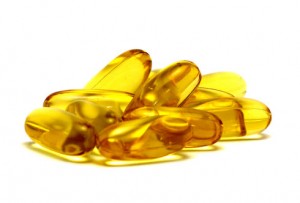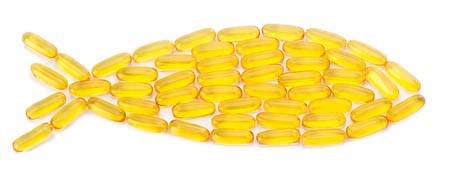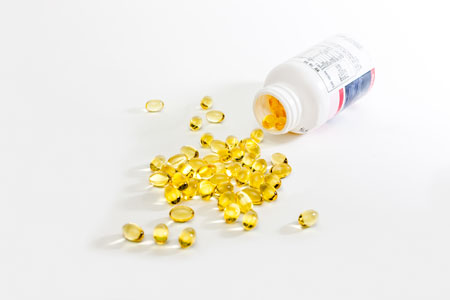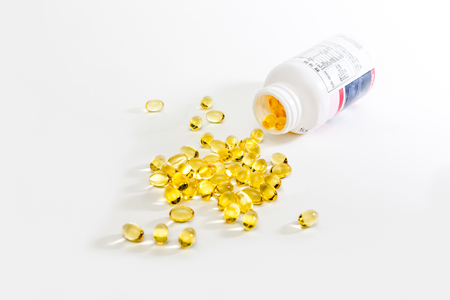Meta-Analysis Finds Omega-3 Fatty Acids Do Not Reduce Cardiovascular Disease Risk
 In a 2018 meta-analysis published in the journal JAMA Cardiology, researcher Theingi Aung and colleagues found that across 10 studies including a total of 77,197 participants, omega-3 fatty acid supplementation did not reduce risk of coronary heart disease in people at high risk. This newer finding conflicts with a 2017 advisory from the American Heart Association that suggested omega-3 fatty acid supplementation might prevent cardiovascular disease.
In a 2018 meta-analysis published in the journal JAMA Cardiology, researcher Theingi Aung and colleagues found that across 10 studies including a total of 77,197 participants, omega-3 fatty acid supplementation did not reduce risk of coronary heart disease in people at high risk. This newer finding conflicts with a 2017 advisory from the American Heart Association that suggested omega-3 fatty acid supplementation might prevent cardiovascular disease.
When it comes to mood disorders, it has been similarly difficult to pin down whether omega-3 fatty acids are helpful. Data on omega-3 fatty acid supplements for the prevention of depression have been ambiguous, with small numbers of studies and variations in study design that make it difficult to draw strong conclusions about whether these supplements can improve or prevent depression.
A 2016 systematic review by Paola Bozzatello and colleagues in the Journal of Clinical Psychiatry found only seven studies of omega-3 fatty acid supplementation in bipolar disorder. The studies had small sample sizes and widely varying dosage parameters, so the evidence that can be drawn from them is not strong, but the review did find a modest benefit on bipolar depression (but not mania) when omega-3 fatty acids were added to a treatment regimen, compared to treatment as usual.
The same review found that studies of omega-3 fatty acid supplementation in unipolar depression also varied widely, and thus it was difficult to draw inferences from them. Some meta-analyses found no benefit to omega-3 fatty acid supplementation, while others suggested that omega-3s could improve depression. The review found that the type of omega-3 fatty acids used might matter. Supplementation with EPA seemed to improve depression more than supplementation with DHA. The review also cited a 2014 comprehensive meta-analysis by Giuseppe Grosso and colleagues in the journal PLoS One that analyzed the findings from 19 studies in people with depression or depressive symptoms. Grosso and colleagues found that people with more severe depression seemed to benefit more from omega-3s.
Omega-3 Fatty Acids Improve Executive Function in Youth with Mood Disorders
A 2017 study by Anthony T. Vesco and colleagues in The Journal of Child Psychology and Psychiatry suggests that in youth with depression or bipolar not otherwise specified (BP-NOS), omega-3 fatty acid supplements improve executive functioning and behavior regulation compared to placebo.
Ninety-five participants aged 7–14 years received two capsules daily of either omega-3 fatty acids (1.87g total per day, mostly consisting of EPA) or placebo for 12 weeks. Those who received omega-3s showed improvement in executive functioning (which can include planning and decision-making), behavioral regulation, and metacognition, as rated by their parents.
Editor’s Note: Since omega-3 fatty acids have no known side effects, there is little reason not to try them in youth with depression or bipolar disorder.
Omega-3 Fatty Acids Improve ADHD
 A 2017 systematic review and meta-analysis found that omega-3 fatty acid supplementation improves symptoms of attention-deficit hyperactivity disorder (ADHD) in children and adolescents. The article by Jane Pei-Chen Chang and colleagues in the journal Neuropsychopharmacology identified seven randomized controlled trials in which omega-3 fatty acids improved clinical symptoms of ADHD, and three trials in which omega-3s improved cognitive measures associated with attention.
A 2017 systematic review and meta-analysis found that omega-3 fatty acid supplementation improves symptoms of attention-deficit hyperactivity disorder (ADHD) in children and adolescents. The article by Jane Pei-Chen Chang and colleagues in the journal Neuropsychopharmacology identified seven randomized controlled trials in which omega-3 fatty acids improved clinical symptoms of ADHD, and three trials in which omega-3s improved cognitive measures associated with attention.
The meta-analysis also found that children and adolescents with ADHD have lower than normal levels of the omega-3s DHA and EPA, in addition to lower total levels of omega-3s measured in blood and cheek tissues.
Chang and colleagues suggest that omega-3 fatty acid supplementation is a potentially helpful and largely risk-free treatment option for ADHD in children and adolescents.
Omega-3 Fatty Acids May Be Helpful Early in Schizophrenia, But Not Later
 Some studies have suggested that omega-3 fatty acids may be helpful in the treatment of schizophrenia, but data to support this idea have been inconsistent. A recent meta-analysis of research on omega-3s and schizophrenia suggests that this nutritional supplement might be more useful in early-stage schizophrenia than in later illness.
Some studies have suggested that omega-3 fatty acids may be helpful in the treatment of schizophrenia, but data to support this idea have been inconsistent. A recent meta-analysis of research on omega-3s and schizophrenia suggests that this nutritional supplement might be more useful in early-stage schizophrenia than in later illness.
At the 2016 meeting of the Society of Biological Psychiatry, researchers led by Alexander T. Chen presented the findings of their meta-analysis. First they analyzed six studies that shared a common scale for measuring schizophrenia symptoms. In these studies, omega-3 fatty acids did not outperform placebo when used as an add-on treatment to antipsychotics for people with schizophrenia.
In four remaining studies of omega-3 fatty acids and schizophrenia, the omega-3s were associated with improvement only in patients in the early stages of schizophrenia. Compared to placebo, the supplements decreased non-psychotic symptoms, decreased the dosage of antipsychotic medication patients required, and improved early treatment response (but not late treatment response) in patients in their first episode of schizophrenia.
In the same study, omega-3 fatty acids also reduced conversion to full-blown schizophrenia and psychotic symptom severity in patients at high risk for schizophrenia who were having preliminary symptoms of the illness.
Editor’s Note: Researcher Paul E. Keck has also found that omega-3 fatty acids may be more effective early in bipolar disorder rather than later. He reported that younger patients with bipolar depression and rapid cycling showed more improvement when taking the omega-3 fatty acid EPA than when taking placebo. In contrast, patients with bipolar depression who were over the age of 45 did worse on EPA than on placebo.
Part of the ambiguity about whether omega-3 fatty acids can help treat or prevent mental illness may be explained by the supplements working better in younger people or earlier in the course of an illness.
Omega-3 Fatty Acids Associated with Small Improvement in Depression in Children Aged 7–14
At the 2015 meeting of the American Academy of Child and Adolescent Psychiatry, researcher Mary A. Fristad reported that omega-3 fatty acid supplements had a small beneficial effect on depression in children aged 7–14. The supplements did not noticeably improve bipolar disorder not otherwise specified (NOS) or mania. The supplements consisted of several types of omega-3 fatty acids, including 1400mg of EPA, 200mg of DHA, and 400mg of others per day. The children were also undergoing psychotherapy during the study.
Omega-3 Fatty Acids Prevent Conversion to Psychosis
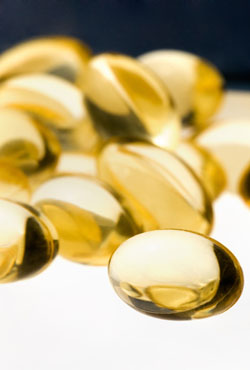 A new long-term study of omega-3 polyunsaturated fatty acids for psychosis prevention shows that almost seven years after a 3-month stint of receiving these dietary supplements daily, adolescents and young adults at high risk for psychosis showed fewer symptoms of conversion to full-blown psychosis than those who received placebo during the same period.
A new long-term study of omega-3 polyunsaturated fatty acids for psychosis prevention shows that almost seven years after a 3-month stint of receiving these dietary supplements daily, adolescents and young adults at high risk for psychosis showed fewer symptoms of conversion to full-blown psychosis than those who received placebo during the same period.
The research team, led by Paul Amminger, originally found that among 81 youth (mean age 16.5) at high risk of developing psychosis due to their family histories, the 41 who received 12 weeks of daily supplementation with 700mg of eicosapentaenoic acid (EPA) omega-3s and 480 mg of docosahexaenoic acid (DHA) omega-3s showed reduced likelihood of conversion to psychosis one year later than the 40 who received placebo.
The team followed up an average of 6.7 years later with 71 of the original 81 participants. Among those who had received the omega-3 intervention, 9.8% had developed psychosis. Among the placebo group, 40% had developed psychosis, and they had done so earlier.
In addition, the omega-3 participants were better functioning, they had required less antipsychotic medication, and they had lower rates of any psychiatric disorder than the placebo group.
Amminger wrote in the journal Nature Communications, “Unlike antipsychotics, fish oil tablets have no side effects and arent’s stigmatizing to patients.”
Editor’s Note: Because of their lack of side effects, a good case can be made for omega-3 fatty acids for patients at high risk for psychosis. The novel thing about this study is that short-term treatment with omega-3 fatty acids had preventive effects almost 7 years later.
People with High Inflammation Respond Best to EPA Omega-3 Fatty Acids in Depression
Omega-3 fatty acids are found in some green vegetables, vegetable oils, and fatty fish. There is some evidence that omega-3 fatty acid supplements can reduce depression, but researchers are trying to clarify which omega-3s are most helpful, and for whom. A new study in Molecular Psychiatry suggests that depressed people with higher inflammation may respond best to EPA omega-3 fatty acids compared to DHA omega-3 fatty acids or placebo. Researchers led by M.H. Rapaport divided people with major depressive disorder into “high” and “low” inflammation groups based on their levels of the inflammatory markers IL-1ra, IL-6, high-sensitivity C-reactive protein, leptin, and adiponectin. Participants were randomized to receive eight weeks of treatment with EPA omega-3 supplements (1060mg/day), DHA omega-3 supplements (900mg/day), or placebo.
While overall treatment differences among the three groups as a whole were negligible, the high inflammation group improved more on EPA than on placebo or DHA, and more on placebo than on DHA. The authors suggest that EPA supplementation may help relieve symptoms of depression in people whose depression is associated with high inflammation levels, a link common among obese people with depression.
Editor’s Note: These data add to a study by Rudolph Uher et al. in which people with high levels of C-reactive protein responded better to the tricyclic antidepressant nortriptylene, while those with low levels of the inflammatory marker responded better to the selective serotonin reuptake inhibitor antidepressant escitalopram.
Omega-3 Fatty Acids Improve Attention in Boys
A new study finds that omega-3 fatty acid supplementation improves attention in boys both with and without attention deficit hyperactivity disorder (ADHD). The study by Dienke J. Bos and colleagues in the journal Neuropsychopharmacology included 40 boys (aged 8–14) with ADHD and 39 demographically matched controls. Participants were given 10 g per day of margarine supplemented with either omega-3 fatty acids (eicosapentaenoic acid (EPA) and docosahexaenoic acid (DHA)) or placebo.
The children who received EPA/DHA supplementation showed improvements in attention (as rated by parents) compared to those who received placebo. Improvement was greater in the children with ADHD. Supplementation did not affect cognitive control or brain activity on functional magnetic resonance imaging (fMRI). Those boys who received omega-3s showed higher DHA levels on followup.
Omega-3 Fatty Acids Improve Mood and Limbic Hyperactivity in Youth with Bipolar Depression
Children who have a parent with bipolar disorder are at risk for bipolar illness, but it may first present as depression. Treating these children with antidepressants has the risk of bringing on manic episodes. Researchers are looking for treatment options for youth at risk for bipolar disorder.
Robert McNamara and colleagues found that 12 weeks of omega-3 fatty acids (2,100 mg/day) significantly improved response rates in medication-free youth ages 9–20 years compared to placebo (64% versus 36%). Omega-3 fatty acids but not placebo also reduced the activation of limbic structures in the brain (the left parahippocampal gyrus) in response to emotional stimuli.
Editor’s Note: These data add to the literature on the positive effects of 1–2 grams of omega-3 fatty acids in depression. Given the safety of omega-3 fatty acids and the ambiguous effects of antidepressants in bipolar depression, omega-3 fatty acids would appear to a good alternative, especially since the FDA-approved atypical antipsychotics (quetiapine and lurasidone) are not approved for bipolar depression in people under age 18.
Ambiguity in the Data on Omega-3 Fatty Acids for Depression
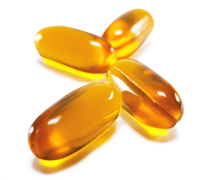 In a recent randomized, controlled clinical study comparing two types of omega-3 fatty acid supplements (one with EPA and one with DHA) with placebo in 196 adults with major depression, there were no statistically significant differences in outcomes across the three groups. The participants received the treatments for eight weeks, and response and remission rates were 40-50% in those receiving either omega-3 preparation (at doses of 1000mg/day) and 30% for placebo. The research was published by David Mischoulon and colleagues in the Journal of Clinical Psychiatry.
In a recent randomized, controlled clinical study comparing two types of omega-3 fatty acid supplements (one with EPA and one with DHA) with placebo in 196 adults with major depression, there were no statistically significant differences in outcomes across the three groups. The participants received the treatments for eight weeks, and response and remission rates were 40-50% in those receiving either omega-3 preparation (at doses of 1000mg/day) and 30% for placebo. The research was published by David Mischoulon and colleagues in the Journal of Clinical Psychiatry.

